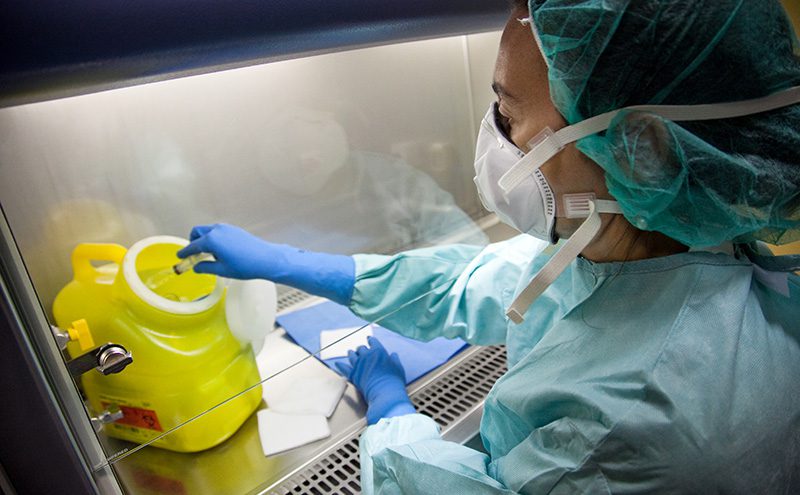
Recent national media coverage highlighting issues surrounding the disposal of NHS clinical waste has painted a very unpleasant picture of a system in chaos. Graham Flynn, managing director of Anenta, a firm that operates in this sphere, reflects on the situation and how it might be resolved.
Clinical waste is an often overlooked but inevitable aspect of medical treatment. Some form of waste is generated during each clinical interaction with a patient and the number of interactions is rising every year. The volume of waste generated is therefore also increasing.
A recent furore, involving the clinical waste disposal contractor Healthcare Environmental Services, was widely reported in the media. It is unfortunate that such reports can give the impression of something like a stockpiling of human body parts, awaiting incineration – normally this kind of material constitutes less than 1% of the total volume of clinical waste.
All the same, clinical waste cannot simply be disposed of or recycled like most domestic or commercial waste. In every case it requires specialist treatment, one such method being high-temperature incineration.
Incineration capacity
Recent events bring some focus to the question of whether the UK’s high-temperature incineration capacity is sufficient to handle the volume of waste produced not just today but in the coming years, as waste volumes continue to rise.
The Environment Agency has stated that there is sufficient incineration capacity in the UK. In the waste industry, however, opinion is divided: some insist that incineration capacity is diminishing, and falling short of what is needed. To some degree, it depends on how you consider the issue, and whether the focus is on the operators’ permitted capacity or their operational capacity or indeed the capacity demand of commercial interests.
Whatever conclusion is drawn, the current situation is clearly not an advantageous one for the customer, in this and most cases, the NHS. Indeed, it has become apparent that a number of clinical waste contractors have sought to profit from the current situation by increasing their standard tonnage rates, the reduced level of competition leaving the NHS with fewer options and little choice but to pay what is at best, an unfair price.
Such practices are short-sighted and ultimately can only impact upon the industry negatively, diminishing its reputation all the more. Now more than ever, it is fair and transparent pricing that is required for an appropriate level of servicing. This ethos is at the heart of Anenta’s business model and we will continue to work with our clients to mitigate the impact of poor practice and deliver best value for our clients.

What needs to happen
Many people already familiar with NHS waste disposal may not be surprised by the difficulties the sector now faces and the current disposal challenges. The issue highlights two key points: the need for a more robust risk assessment and management process in the NHS, and whether investment is now required as a matter of urgency to boost capacity.
Change within the NHS is required too, to achieve best value. Arguably one of the most effective means by which the NHS could improve upon the issues highlighted is to overhaul the way in which clinical waste contracts are procured.
The need for change in the procurement process is apparent when you look at recent litigation between the NHS and leading clinical waste contractors. As a matter of urgency, the NHS needs to move away from the race-to-the-bottom ethos apparent from its use of these kinds of e-auctions. And it must assess the quality of service it will receive in a more robust manner.
Such changes would be welcomed by the industry’s trade associations, and would help drive genuine innovation and an effort to improve efficiencies in the way this kind of waste is managed. The existing process effectively curtails this.
Unnecessarily complicated procurement and contract management processes present a major challenge. Changes are needed to the way contracts are specified – at present, those responsible for procuring waste management contracts have a very limited understanding of NHS waste management requirements. Trusts end up paying for services which are either not fit for purpose financially, or do not deliver as they should.
There needs to be an overhaul of the existing procurement framework. At present, the award of high-value contracts (in excess of £118,133 pa) is currently subject to a Supply, Services and Design Contract standard framework, which acts against the delivery of best value to the Trust in question. Typically the public sector issues standard and out-dated specifications resulting in recycled tender responses being returned. There is little scope to take account of new developments and efficiencies on the part of the service supplier.
Problems also exist with the way contracts are managed. Anenta’s analysis of NHS contracts has highlighted that, in the majority of cases, once the service has been procured, it is not managed effectively and in a significant number of cases, it is not managed at all by the customer.
Many Trusts rely upon contractors to self-manage and indeed, for some, there is no viable alternative. A lack of waste contract management expertise combined with a lack of ownership within the NHS means that, in many instances, it falls to inexperienced staff to handle waste management contracts – something which they have neither the time nor appropriate expertise to do.
Another unfortunate reality is the overriding perception that once a service has been procured, the job is complete. That can only lead to low levels of efficiency at best and high levels of waste, or front line cuts, at worst.
Changes to the procurement process, delivered in tandem with more effective, proactive contract management, could allow a significant improvement in service levels as well as compliance. They would also enable the NHS to improve its risk assessment process, identifying issues such as those now being reported, much further in advance.
Ageing infrastructure, the impact of zero waste to landfill policies and limited high-temperature incineration capacity have been cited as the underlying cause for recent events. While this debate will continue, it is clear there is very little slack in the system as capacities are held for commercial reasons and planned or unplanned shutdowns.
When one considers the bigger picture beyond this debate, it is clear that with the appropriate open discussion and investment, the UK’s clinical waste disposal capacity could be increased significantly. Critically, this increased disposal capacity would mean new operators in the market place, greater competition and greater transparency allowing the NHS to secure a fair price for an appropriate level of service.
This can only benefit the NHS and ultimately secure better value for the public purse.







